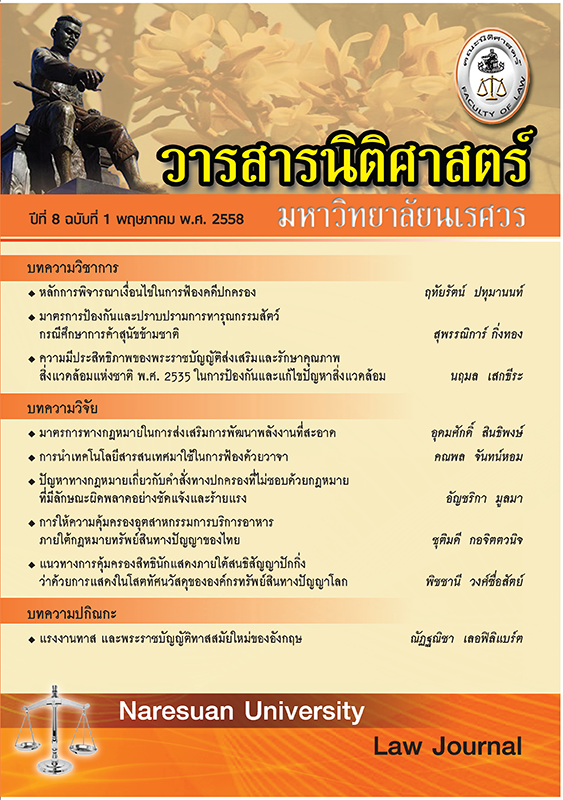Performer’s Right Protection Under the Beijing Treaty on Audiovisual Performances of the World Intellectual Property Organization (WIPO)
Main Article Content
Abstract
The purpose of this research is to study the guideline for performers’ rights protection under the World Intellectual Property Organization’s Beijing Treaty on Audiovisual Performances, including neighboring rights of the performers under Thailand’s Copyright Act B.E. 2537 (1994) as well as neighboring rights protection under international laws, i.e., Rome Convention 1961, WIPO Copyright Treaty (WCT) 1996, WIPO
Performances and Phonograms Treaty (WPPT) 1996, Beijing Treaty on Audiovisual Performances 2012 and the U.S. Performers Right Protection Law The finding of the study shows that the performers’ right protection in Thailand officially exists after the enacting of Copyright Act B.E. 2537, which the regulations of the Rome Convention 1961 had been adopted and applied to the aforesaid Act, which at that time, the recording and audiovisual technologies were not much developed as it is nowadays. At the present, the protection under the Copyright Act is insufficient to protect the benefits that performers in Thailand should gain from audiovisual performances recording and this causes loss of incomes. According to the international treaties, such as WIPO Copyright Treaty (WCT) 1996, WIPO Performances and Phonograms Treaty (WPPT) 1996, there was only the protection for sound recording. Later in 2012, after the existence of Beijing Treaty on Audiovisual Performances, which many states have ratified the treaty, the treaty shows that the scope of protection was expended but Thailand has not yet joined as a member state. As a result, the researcher compares the differences between Copyright Act B.E. 2537 and Beijing Treaty on Audiovisual Performances 2012 and finds that section 44 and section 45 of the Act cause problems of interpretation as follows: 1)the interpretation problems due to the definition of “performer”; 2) the lack of contents related to performers’ moral rights protection under Copyright Act B.E. 2537 ;consequently, the performers cannot take any legal actions in case their reputations and honors are abused;. 3) problem in clear-cut interpretation of live performances and recorded performances protection; 4) section 45 of the Copyright Act B.E. 2537 does not cover the earning of remuneration in case the original work or copy used for commercial purposes by others. In contrast, Beijing Treaty on Audiovisual Performances 2012 provides protection to performers towards moral rights as well as provides clear-cut explanation on protection of live performances and recorded performances. The treaty also covers the remuneration from the original work or its copies being used for commercial purposes. Therefore, is article suggests that Thailand should be a part of Beijing Treaty on Audiovisual Performances 2012 as member state for expanding scope of performers rights protection as the Copyright Act B.E. 2537 and other treaties does not cover the necessary contents as mentioned above.
Performances and Phonograms Treaty (WPPT) 1996, Beijing Treaty on Audiovisual Performances 2012 and the U.S. Performers Right Protection Law The finding of the study shows that the performers’ right protection in Thailand officially exists after the enacting of Copyright Act B.E. 2537, which the regulations of the Rome Convention 1961 had been adopted and applied to the aforesaid Act, which at that time, the recording and audiovisual technologies were not much developed as it is nowadays. At the present, the protection under the Copyright Act is insufficient to protect the benefits that performers in Thailand should gain from audiovisual performances recording and this causes loss of incomes. According to the international treaties, such as WIPO Copyright Treaty (WCT) 1996, WIPO Performances and Phonograms Treaty (WPPT) 1996, there was only the protection for sound recording. Later in 2012, after the existence of Beijing Treaty on Audiovisual Performances, which many states have ratified the treaty, the treaty shows that the scope of protection was expended but Thailand has not yet joined as a member state. As a result, the researcher compares the differences between Copyright Act B.E. 2537 and Beijing Treaty on Audiovisual Performances 2012 and finds that section 44 and section 45 of the Act cause problems of interpretation as follows: 1)the interpretation problems due to the definition of “performer”; 2) the lack of contents related to performers’ moral rights protection under Copyright Act B.E. 2537 ;consequently, the performers cannot take any legal actions in case their reputations and honors are abused;. 3) problem in clear-cut interpretation of live performances and recorded performances protection; 4) section 45 of the Copyright Act B.E. 2537 does not cover the earning of remuneration in case the original work or copy used for commercial purposes by others. In contrast, Beijing Treaty on Audiovisual Performances 2012 provides protection to performers towards moral rights as well as provides clear-cut explanation on protection of live performances and recorded performances. The treaty also covers the remuneration from the original work or its copies being used for commercial purposes. Therefore, is article suggests that Thailand should be a part of Beijing Treaty on Audiovisual Performances 2012 as member state for expanding scope of performers rights protection as the Copyright Act B.E. 2537 and other treaties does not cover the necessary contents as mentioned above.
Article Details
How to Cite
Wongsuesat, Pitchanee. “Performer’s Right Protection Under the Beijing Treaty on Audiovisual Performances of the World Intellectual Property Organization (WIPO)”. Naresuan University Law Journal 8, no. 1 (May 1, 2015): 156–174. accessed March 5, 2026. https://so04.tci-thaijo.org/index.php/lawnujournal/article/view/98736.
Section
Research Articles
References
กรมทรัพย์สินทางปัญญา กระทรวงพาณิชย์. "คู่มือของสิทธินักแสดง." แก้ไขล่าสุดเมื่อ 2553. สืบค้นเมื่อ 15 มิถุนายน 2556. https://www.ipthailand.go.th/en/images/handbook.doc.
กรมทรัพย์สินทางปัญญา. "เข้าใจลิขสิทธิ์และสิทธิข้างเคียง." แก้ไขล่าสุดเมื่อ 2556. สืบค้นเมื่อ 10 พฤษภาคม 2556. https://www.wipo.int.
จักรกฤษณ์ ควรพจน์. ลิขสิทธิ์ สิทธิบัตร และเครื่องหมายการค้า. กรุงเทพฯ: นิติธรรม, 2554.
ไชยยศ เหมะรัชตะ. คำอธิบายกฎหมายลิขสิทธิ์. กรุงเทพฯ: นิติธรรม, 2545.
นินนาท บุญยะเดช. "หลักเกี่ยวกับ Originality และ ขนาดความวิริยะอุตสาหะที่ลง ในการสร้างสรรค์งานกับกฎหมาย ลิขสิทธิ์ไทย: ศึกษาเทียบเคียงกับกฎหมายของสหรัฐอเมริกา." แก้ไขล่าสุดเมื่อ 2549. สืบค้นเมื่อ 10 กรกฎาคม 2556. https://www.gotoknow.org/posts/64047.
กรมทรัพย์สินทางปัญญา. "เข้าใจลิขสิทธิ์และสิทธิข้างเคียง." แก้ไขล่าสุดเมื่อ 2556. สืบค้นเมื่อ 10 พฤษภาคม 2556. https://www.wipo.int.
จักรกฤษณ์ ควรพจน์. ลิขสิทธิ์ สิทธิบัตร และเครื่องหมายการค้า. กรุงเทพฯ: นิติธรรม, 2554.
ไชยยศ เหมะรัชตะ. คำอธิบายกฎหมายลิขสิทธิ์. กรุงเทพฯ: นิติธรรม, 2545.
นินนาท บุญยะเดช. "หลักเกี่ยวกับ Originality และ ขนาดความวิริยะอุตสาหะที่ลง ในการสร้างสรรค์งานกับกฎหมาย ลิขสิทธิ์ไทย: ศึกษาเทียบเคียงกับกฎหมายของสหรัฐอเมริกา." แก้ไขล่าสุดเมื่อ 2549. สืบค้นเมื่อ 10 กรกฎาคม 2556. https://www.gotoknow.org/posts/64047.


